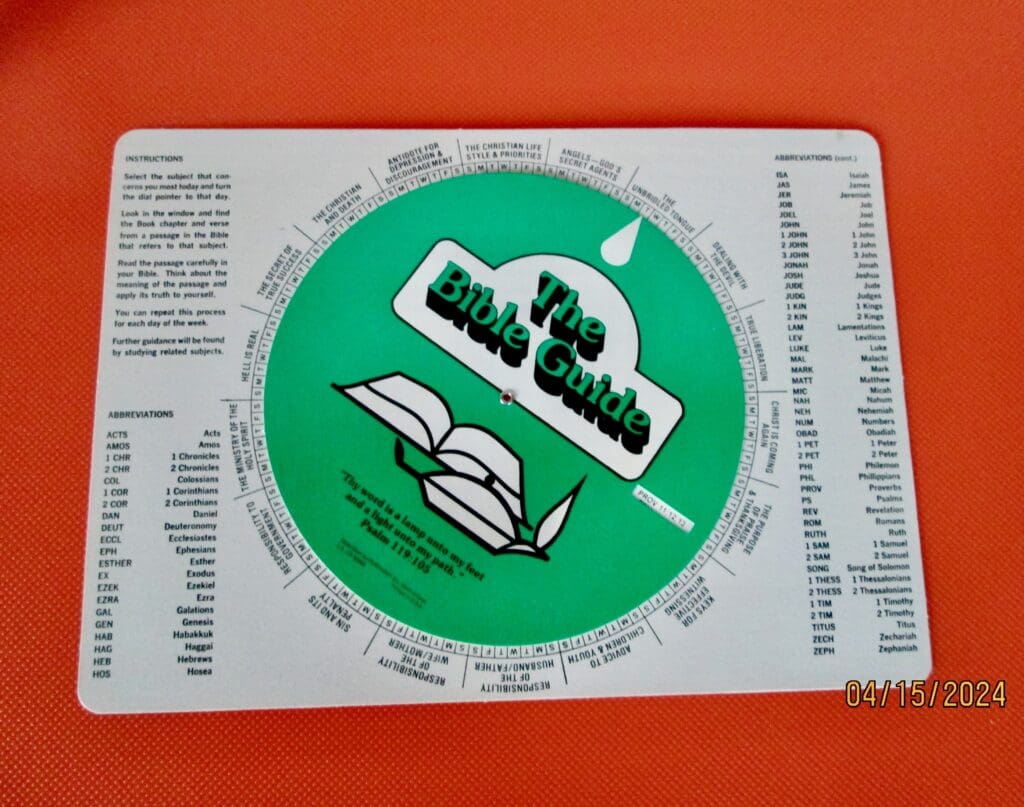I recently visited my parents as my dad celebrated his 90th birthday. He is a retired Southern Baptist Preacher who graduated from Fruitland Baptist Bible College in Hendersonville, N.C. I’ve mentioned in a previous blogpost that I was being allowed to take his old books from his college days, along with other books he has added to his collection over the years. Some of them were given to him by his church members.
I brought home more books after this visit and have spent some time cleaning them and getting them placed on my bookshelves.
Here are a few examples of what I have:


While I was going through the books, I found a very interesting tool for Bible study. It was from the Billy graham Evangelistic Association with a copyright of 1977.

You pick a topic and place the white arrow on it. Then you pick a day of the week to read the reference. The window on the side gives a Bible reference for the subject. In the picture the arrow is pointing to “The Unbridled Tongue” for Tuesday. The reference in the window is Proverbs 11:12,13. The verses say, “He that is void of wisdom despiseth his neighbour: But a man of understanding holdeth his peace. A talebearer revealeth secrets: But he that is of a faithful spirit concealeth the matter.”
Here are some other headings on the wheel:
- When thoughts need control
- The guilt trip
- When tempted to drink
- Identifying false teachers
- The purpose and power of prayer
- Business ethics
- Why Christians suffer
- When fear comes calling
- Seeking the will of God
- Warning against pride
There are 36 topics in all on the card. If you happen to be able to find one of these tools for yourself, I highly recommend getting one. It is amazing to use.
Another book I brought home was titled Can You Cope with Happiness? by Joyce Duco. The copyright date is 1983.
I was flipping through the pages and landed on chapter 12. When I saw the title, “Understanding Negative People”, I just had to stop and read a while.
Here’s what I learned:
There are two types of negative people—
- “In Group A are the people who are negative either because they are not aware or because they don’t know how to escape from their negative lifestyle.”
- “The people who are chronically negative and enjoy every moment of it belong in Group B. For these people negativity is a way of life — a commitment. They have no intention of changing and God help us if we try to deprive them of their misery!” (p. 73)
She continues on the next page… “Listen carefully as these people speak of their unhappiness. They would have you convinced that their lives are one tragedy after another. If so, it’s because they have chosen tragedy as a lifestyle… and they thrive on it. They need it. Somehow their natures require punishment, possibly to satisfy some conscious or unconscious guilt. Or suffering may be the way their need for attention is satisfied.” (p.74)
She tells the story of a guy who was filming a documentary about “Street People.” He became attached to a sweet old lady living on the streets. Before the film crew left he had set her up in an apartment stocked with food. A few weeks later he returned to find her living on the streets once more. The author says, “This true story helped me to realize that we don’t always know what’s best for the other person. The street lady chose the streets because she needed the streets. We might ask, ‘Is that normal?’ For you and me it may be abnormal.” (p.75)
The author says, “We can GIVE advice but we have no right to IMPOSE it because it may not suit the needs of that other person.” (p. 75)
She continues, “The next time someone relates a stressful situation to you, just ask, ‘Why do you need it?’ That will either shock them into a new way of looking at their problem, or offend them so much that they will never share their ‘suffering’ with you again. Thank God!” (p.75) (Ha Ha)
This author also taught seminars in Los Angeles about dealing with negative people. She taught that it is our Christian responsibility to not over do or over give to these type people. If we give too much they are never motivated to achieve. She says, “These people we give to the most appreciate us the least. They lose respect for us and take us for granted as they watch us drain ourselves physically, psychologically, financially and emotionally, to give [to] them. We are their doormats, and no one respects a doormat. Because of us they have developed into unmotivated self-centered individuals, and they hate us for it….Only when we stop taking care of them will they start taking responsibility for their own actions.” (p.76)
The author says that she was an educator in the parochial schools for 17 years and she never heard students brag about an easy teacher or parent. Instead they made jokes about how they were allowed to “get away with murder.” But the teachers and parents they respected were the tough ones, not the doormats. She says that we need to model strength and discipline and— “Sincere positive living will do more than a thousand words.” (p.77)
What are your thoughts on how to deal with negative people?
